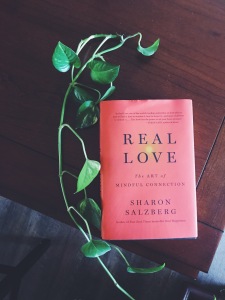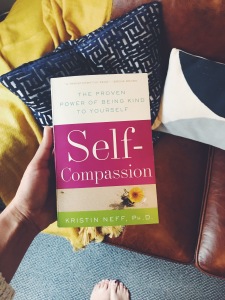On the shame we know, the self-compassion we need.

Self-Compassion
I used to laugh and half-roll my eyes when people would suggest I was a perfectionist. I would smile and internally affirm that those people really didn’t know me. Sometimes I would outwardly disagree. “I don’t have to have things be perfect or just right. I don’t get obsessed with details or making things look perfect,” I would say. They didn’t know that I half-hazardly cut out papers and pictures to stick into my scrapbook or that I didn’t follow the artist’s precise teaching during paint-and-wine nights. They didn’t know that my bedroom is often disheveled with covers thrown astray or that I still considered a bowl of cereal to be an adequate dinner.
And then I read a book and took a gentle and honest look within. I learned what perfectionism really is. When I read Kristen Neff describe it as this ‘compulsive need to achieve and accomplish one’s goals with no allowance for falling short of one’s ideals,’ I immediately felt both validated and surprised. I wasn’t sure how I had missed it after all this time, but it finally captured the stress, anxiety, and worry I regularly experience in pursuit of the things that are most important to me. Perfectionism is one of those character traits that is culturally accepted and even encouraged in our society of achievement and ‘specialness.’ It’s often considered a strength in someone’s character to set unrealistically high standards and work compulsively to achieve them. We continue to reward high productivity and form our perceptions of people based on what they have accomplished. The other side of perfectionism, however, is that when our efforts fall short of the extremely high expectations we place on ourselves, we experience feelings of inadequacy, guilt, or shame. The other side of perfectionism is the deep sense of disappointment and frustration we feel towards ourselves and the decreased sense of self-worth after making a mistake. And in pursuit of greater self-compassion, I began to more closely notice the shame I experience when it comes to performance and work. In the past, shame came from the grades I received in school or the papers I wrote in college. Today, I experience shame when I feel like I’m falling short at work or feel that I’m being judged as incompetent.
Although we may experience it differently, we all know the pains of shame. That heavy sinking feeling in the pits of our stomachs or the loud tightness in our chests. The tears that well up in our throat and eyes because we feel flawed and inadequate. The hollowness. An internal sense of “not-enoughness” or tinges of emptiness that come from how we judge our appearance, weight, mental health, addiction, gender, or race. It may not be work for you; maybe you experience shame as a mother, in comparing your childrearing abilities to the mothers you see on the screens of your telephone, or the mothers around you. Maybe you feel inadequate in your ability to not only raise tiny humans but in your perceived shortcomings of “being unable to balance it all.” Maybe you look in the mirror, at the size of your pants, or the weight on the scale, and feel this deep sense of embarrassment, dislike, or shame . This frustration and sense of not being good enough to measure up to society’s unrealistic and false sense of beauty. Maybe you feel like a failure as a provider for your family, or maybe shame shows up when you think about trauma from your past.
Shame is the fear we have about someone discovering who we really are and it’s the secrets we keep about our deepest vulnerabilities. It is the effort and discomfort we place on ourselves to mask these feelings of ‘not-okay.’
I share my shame and try to write about yours because we need to know that it exists for all of us. That part of being human is to experience this shame- and that part of our growth is to be connected by it.
This is an invitation to be curious about how shame shows up in your life and why. To understand the importance of getting to know yourself in this way so that we can each begin to sense our individual suffering. So that we can start to understand the depth of pain caused by our feeling of not-enoughness, and so that we can turn to ourselves with kindness.
Self-compassion is not a superficial dismissal of your pain or a “think positive” kind of attitude. It’s an intentional recognition of your suffering. It’s seeing the hurt, the challenge, the sadness, the disappointment, and choosing to turn towards yourself in this moment- instead of away. Self-compassion is learning how to listen for both the inner critic and inner soother, and choosing to befriend yourself in moments of disappointment and mistakes- rather than berate.
We all know how to bully ourselves and can easily point out our greatest flaws- we often rattle them off to our friends, family members, and in the conversations we have with ourselves in our mind. What’s hardest for us all is to learn how to comfort ourselves in our greatest shame. To sit with ourselves in kindness as they tears rolls down our face after being made fun of, after getting let go of for a job, after yelling at our children, or needing to ask for help. Self-Compassion is about noticing misguided attempts to self-soothe through unhealthy behaviors and about learning gentler ways to approach ourselves instead. A comforting comment, a recognition that your worth is not dependent on your accomplishment or appearance, and even a kind validation acknowledging how difficult moments can be.
Self-compassion is about being able to fully inhabit the present moment- allowing yourself to feel what is yours to feel. To sit with the discomfort, to take a deep breath, and to name it. To self-soothe, to call a friend, to tell yourself that it’s okay. Self-compassion is the way we create space for ourselves to grow inwardly, to befriend ourselves enough so that we can create room to learn from our mistakes.
The only way that we grow is to know what’s planted inside. We must know what weeds to sort through, to treat, and to unroot. We must make room for the flowers that are ready to bloom inside.
What I know is that sunlight is to flowers as self-compassion is to healing.









1 Comment
This was the most timely post I’ve ever had in my life. At nearly 60yo I have yet to learn how to master the art of self compassion. I am crying as I read this. Thank you for your wonderful insight and words.